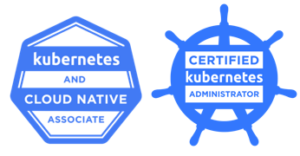Start with the KCNA certification and then get your CKA ! Please review the exam details, domains, competencies, and more by viewing the individual KCNA and CKA certification pages.
Not sure where to start? You may consider reviewing our suggested KCNA & CKA learning paths.
UPCOMING POLICY CHANGE: Please note that our Certification Period Policy is changing effective April 01, 2024, 00:00UTC. Certifications achieved on or after this date will expire 24 months from the date the program certification requirements, including passing the exam, are met. We encourage anyone interested and prepared to schedule and take your exam before the policy change. Please see additional details here.












